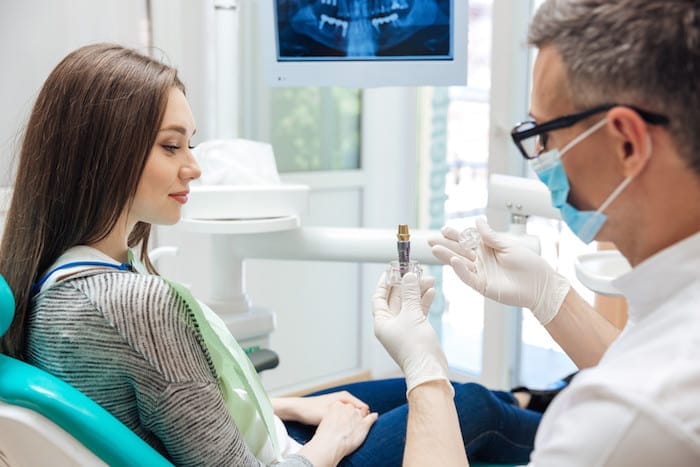Visiting your dentist every six months is an important step to improving and maintaining your oral health. Your dentist can take X-rays and check your mouth for gum disease, cavities, and oral cancer. If you visit your dentist regularly, they can diagnose these issues prior to them causing major problems.
Does medication or changes in your overall health affect your dental health?
It is important that you update your dentist on any changes in your medical history at each appointment. Even if it doesn’t seem important to you, it could make a difference in the way the dentist performs your treatment, including the type of anesthetic that is used. It is helpful to bring a list of your current medications, surgeries and health conditions to your appointment.
What are some common dental health myths?
One common dental myth that I hear a lot is, “My teeth don’t bother me, so there is nothing wrong with them. I don’t need to go to the dentist.”
Most people who get cavities do not realize that they have them at first. Not all cavities can be seen with the naked eye. Cavities in between your teeth need to be diagnosed with X-rays. If you wait until you have a bad toothache or an infection, the treatment to fix the tooth will be more complicated. Instead of a simple filling, you may need a root canal and a crown or maybe even a tooth extraction.
So don’t hesitate to get fillings with this dentist in Greeneville to prevent further oral health complications.
When is it the best time to brush your teeth?
Brushing your teeth two times per day for two minutes with a fluoridated toothpaste is crucial in preventing tooth decay. It is recommended to brush in the morning and prior to going to bed. It is really personal preference if you brush before or after breakfast. If you do like to eat first thing in the morning try waiting 30 minutes after you eat to brush since acidic foods can weaken the enamel. When brushing at bedtime, it is best to not eat or drink anything besides water afterwards. Don’t forget to floss!
What are some early signs of dental troubles?
One of the easiest signs for a person to spot when it comes to oral health problems is bleeding gums. Bleeding gums are a sign of gingivitis and is usually caused by improper home care. Your dental hygienist can go over the proper techniques for brushing and flossing as well as give other recommendations to eliminate gingivitis. Bad breath, or halitosis, is another sign there may be dental troubles.
What are some ways to whiten your teeth?
There are several different ways to whiten your teeth. Sometimes a routine dental cleaning to remove surface staining is sufficient. Over-the-counter remedies such as whitening toothpaste or white strips will work for most people but do take longer because they are not as strong as what you can purchase at a dental office.
Don’t hesitate to ask your dentist what they offer in their office. Custom-made whitening trays with a professional-strength gel are very effective at whitening. Your local dental office or dental lab may even offer an in-office whitening system that will make a dramatic difference for some patients in just one visit. Your dentist will want to examine your teeth prior to whitening to ensure that they are healthy and you are a good candidate for this procedure. Keep in mind that any type of teeth whitening can cause sensitivity so if you already have sensitive teeth this may not be for you.
Throughout the year, our writers feature fresh, in-depth, and relevant information for our audience of 40,000+ healthcare leaders and professionals. As a healthcare business publication, we cover and cherish our relationship with the entire health care industry including administrators, nurses, physicians, physical therapists, pharmacists, and more. We cover a broad spectrum from hospitals to medical offices to outpatient services to eye surgery centers to university settings. We focus on rehabilitation, nursing homes, home care, hospice as well as men’s health, women’s heath, and pediatrics.








